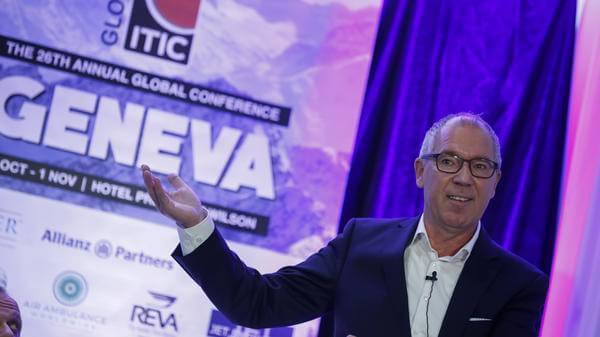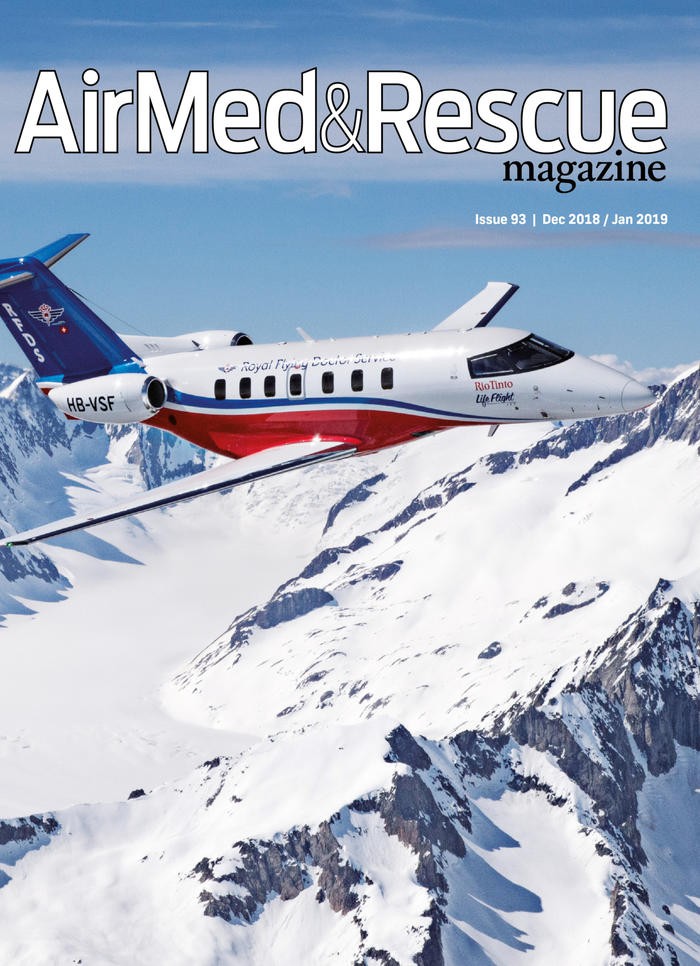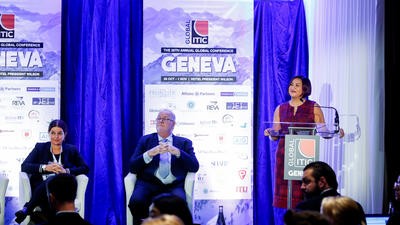ITIC Global 2018 - Air ambulance industry trends

Three industry experts shared their opinions on the latest trends in the international fixed wing air ambulance industry
Dr Gert Muurling, Medical Director, Air Alliance Medflight GmbH, discussed how the development of new antibiotics came to a halt around 30 years ago, which has resulted in a proliferation in cases of drug resistant illnesses. There are resources available that can show which countries have cases of drug-resistant illnesses of various kinds, which can assist an air ambulance company in their decision-making process about which medications to take with them onboard the aircraft when collecting a patient. Dr Muurling also discussed the hygiene risks for the patient and crew when performing a transfer, as well as the risks posed by double stretcher transfers. He then showed how aircraft and crew disinfection is performed and checked.
Volker Lemke, CSO of FAI Air Ambulance, shared with the audience his company’s experience of flying into warzones and other high-risk countries, showing that while they can be high-risk operations, there are many steps taken and tactics employed to minimise and mitigate those risks to crew and aircraft. Performing for and on behalf of the United Nations means that FAI receives a lot of requests to fly into conflict regions and is, thus, experienced in ensuring that as much information as possible is gathered about real-time risks en route to the patient. Detailed risk assessments are carried out before the decision to fly is taken. Preparation, said Volker, is paramount for any air ambulance company considering carrying out high-risk missions, and flight operations in conflict zones must be carefully considered and completed using comprehensive information and risk management.
Graham Williamson, CEO of LIFESUPPORT Air Medical Services Inc., focused on the repatriation of critically ill – but stable – patients onboard commercial airlines. He pointed out the benefits of such flights, including extra space for the crew and patient, and fewer fuel stops meaning faster flights with fewer take offs and landings. They aren’t suitable for all patients, though, and there are many cases where an air ambulance transfer would be more appropriate. Effective case management, said Graham, is key. Each case must be carefully co-ordinated, and every detail is essential. There must also be contingency plans in place for every eventuality. Engaged medical leadership from all stakeholders is, furthermore, absolutely essential.

This session was focused primarily on the introduction of the EU-based General Data Protection Regulation (GDPR), which came into force in May 2018. Florian Thoma, Senior Director, Global Data Privacy for Accenture began by pointing out that while, previously, data privacy had been a topic that only compliance officers knew or cared about, it is now an issue that is top of mind for business leaders, the media and regulators. Data ethics, said Florian, are now a key consideration.
Mickael Tome, Attorney, Barreaux de Luxembourg & de Paris at CLAW, shared his insights about the challenges that faced companies before, during and after the implementation of GDPR, and was forthright in his assessment that ‘it is not possible to achieve full compliance’. There is still time for regulators to alter the rule, though, and it can be adapted to reflect the reality of the marketplace. Going forward, said Mickael, data protection will occur by default, and systems will be designed in such a way that data is held securely, with procedures and practices being built in to businesses.
Jerome Pin, Project and Business Development Manager and Data Protection Officer for Luxembourg Air Rescue Group, gave attendees information about how his company prepared for GDPR, with audits to identify gaps in data security, particularly with regards to medical data. There was a lot of work involved in changing contracts framework to ensure compliance although, in reality, compliance remains a work in progress from both a data protection and information security aspect. Jerome believes that air ambulance and assistance work is not compatible with GDPR due to the nature of needing to exchange data swiftly, and is keen to engage the industry in discussions with the regulator to talk about potential exemption from GDPR regulation.

The European Aero-Medical Institute (EURAMI) reported on their experience of ITIC Geneva, and offered some insights into their Members Meeting.
It was a banner few days for EURAMI at their exhibition booth during ITIC Global. Dr Terry Martin (Chief Auditor) and Claudia Schmiedhuber (Interim Managing Director) proudly welcomed dedicated EURAMI members to discuss, debate and review the past year together. It was evident that accreditation and quality still hold a very prominent place in our industry and that reputable accreditation associations such as EURAMI e.V. are actively contributing to raising quality standards for patient transportation and aeromedical procedures. However, not only current members could be seen sitting at the EURAMI booth; many aeromedical providers are aware of the importance of standardised regulations and are looking to obtain EURAMI recognition to demonstrate quality, safety and responsibility to their insurance and assistance clients.
On 1 November, the 33rd EURAMI General Assembly was held to a packed room of members (most sacrificing their single free afternoon to attend to association business). The presentation, led by President Dr Laurent Taymans, reviewed the last year, including financial results, new accreditations and re-accreditations as well as the achievements and developments within EURAMI.
This year also marked an election year for EURAMI, with three board positions up for election. Dr Taymans (President), Pascaline Wolfermann (Vice-President) and Franziska Hollenstein had completed their terms, whereas Dr Cai Glushak, Philipp Schneider (Treasurer) and Lisa Humphries continued their Board terms.
Incumbent Franziska Hollenstein was re-elected and joined by new members Sergio Abril and Mark Chapman. With the former President and Vice-President having completed their terms, the newly elected Board also assigned the officer roles amongst its members. Dr Glushak was elected as the new President, Philipp Schneider as Vice-President and Mark Chapman took on the role as Treasurer.
The diverse EURAMI Board is composed of members from all sides of the industry: Dr Glushak is the International Medical Director and Chief Medical Officer of AXA Partners; Philipp Schneider is the Key Account Manager for Quick Air Ambulance in Cologne, Germany; re-elected Board member Franziska Hollenstein the Founder of Prime Nursing Care, a global medical escort provider; and Lisa Humphries is the Director of Capital Air Ambulance in the UK. The newly elected Board member Sergio Abril holds the position of VP of Business Development at Airlink Air Ambulance and Treasurer Mark Chapman is the Program Director at Medway Air Ambulance.
In his address to the members, Dr Glushak thanked Dr Taymans and Pascaline Wolfermann for their contribution, being integral to the re-organisation of association leadership and business structure, and their tireless efforts to advance the work of the industry. In particular, he noted that despite the intense pressures on this highly specialised medical services field, he applauded the Board he had worked with for the past two years on its objectivity and sole dedication to quality and safety. He assured members that he would ensure that individual commercial interests be put to the side in favor of pure attention to standards of quality care, patient safety and provider performance and reliability.
The newly elected President, Dr Glushak says that he intends to pursue the vision for EURAMI elaborated by Dr Taymans as well as specific targets during the upcoming term. These include:
- Laying out a five-year plan to chart a course for advancement and sustainability of the organisation and contribution to the field of aeromedical services
- Establishment of an Advisory Committee to incorporate additional experts and stakeholders of the industry that are key to EURAMI’s development and recognition
- Completion and release of the EURAMI 6.0. standards spearheaded by Dr Terry Martin
- Expansion of a highly qualified auditor pool to accelerate accreditation and assure objectivity
- Obtain recognition of EURAMI accreditation by key agencies and government departments
- Enlarge forums for member participation, communication and exchange
- Add to the state of knowledge of the industry
- Ensure consistency and responsiveness to members and the client community.

February 2019
Issue
In this issue:
Helipads and helidecks - Safety concerns driving innovation
Treating psychiatric patients - Sedation or restraint?
Treating gunshot wounds - The latest techniques and equipment
Industry Voice
CAMTS-CAMTS EU announces policy changes
Special Reports
Australia trials drones with HEMS functionality
ITIC Report
Royal College of Nursing Flight Nursing Workshop report
Provider Profile:FinnHEMS
Interview: Claudia Schmiedhuber, Founder and CEO of Alpine Health Consulting, and Interim Managing Director and Business Development Manager of the European Aero-Medical Institute (EURAMI)
Photo gallery
Clear Sky 2018 Ukraine
Mandy Langfield
Mandy Langfield is Director of Publishing for Voyageur Publishing & Events. She was Editor of AirMed&Rescue from December 2017 until April 2021. Her favourite helicopter is the Chinook, having grown up near an RAF training ground!
